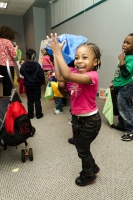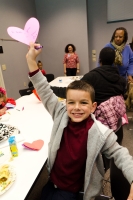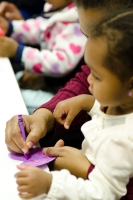Here Comes Kindergarten
Richland Library, S.C.
Innovation Synopsis
We said goodbye to “drive by” storytimes and yes to family engagement, changing the way we deliver a key service. Our plan: engage and motivate parents as partners for children’s success and empower teachers through custom activities that prepare children for school readiness. Targeting these primary influencers changed the game!
Challenge/Opportunity
The National Education Goals Panel’s first goal, Ready to Learn, continues to be a priority across the nation. To meet this goal, the Special Early Childhood Report mandated the following objectives: 1) parents must have access to training and support for the important early foundation for school readiness; 2) parents must learn how to be their child’s first teacher by devoting time each day to help their preschool child learn; and 3) all children need access to high quality and developmentally appropriate preschool programs that help prepare children for school. The Richland Library implemented HCK to meet this challenge. Richland Library offers a life-altering intervention for families whose children are at risk of entering school underprepared. The HCK initiative targeted two impoverished communities, one rural and one urban. The rural community reports an average annual income of $20,114 with 96.5% of its children living below the poverty level. Similarly, the urban community reports an average annual income of $25,000 with 47.7% of its children living below the poverty level. As a means to improve the future for these vulnerable families profoundly hindered by poverty, HCK bolsters school readiness through parent-child skill building activities, children’s books and educational resources to stimulate daily engagement, as well as offering specialized pre-literacy training and curriculum for preschool teachers to promote school readiness in the children they serve.
Key Elements of Innovation
Parents and caregivers will only benefit from the information, activities and resources of HCK to the level of commitment to attend the sessions and their receptiveness to program content. To this end, Richland Library set key elements in place to build a bridge to these vulnerable families and reduce barriers to participation in an effort to galvanize parents’ commitment. At each session, the participating families receive a free nutritious meal and gift certificate; and become eligible for larger monetary incentives based on attendance. In an effort to strengthen receptivity of program content, Richland Library employed a well-received, trained male facilitator from this demographic to begin each session in song and inspiration. To undergird this effort, Richland Library staff members solicited “parent partners” tasked with staying connected to the participating families, as well as invite other preschool families to attend. A key element implemented by HCK to augment high quality and developmentally appropriate preschool programming is to provide preschool teachers with professional development training and curriculum support that satisfies the Continuing Education Credits required for certification. The participating childcare centers also received story times to model pre-literacy skills and “Ten Week Challenges” to encourage applied learning by providing activities to implement school readiness skills. To advance our community, Richland Library took a critical step to promote widespread meaningful change by employing the services of our local university’s Office of Program Evaluation in the College of Education to lead the evaluation efforts of HCK. This critical piece is key to garner evidence-based outcomes as Richland Library seeks to share lessons learned and promote replication of this school readiness project with other libraries and the communities at large.
Achieved Outcomes
HCK has three goals to achieve, each defined by 3 to 4 indicators to measure success: 1) Parents and families will increase their knowledge and understanding of school readiness; 2) Preschool teachers enhance their knowledge of pre-reading skills and access to valuable resources; and 3) Library staff members expand their ability to be a school readiness resource for the community. The interim report from the evaluator indicates that HCK has already met or exceeded its goals and reported a number of key findings: Although HCK initially anticipated serving 15 to 20 families for the year, the success of this project spread so rapidly in the first couple of months that HCK nearly tripled the amount of participating families it served (and is still growing). More than half of participating families have attended 80 percent of the programs. A survey revealed that 100 percent of participating preschool teachers enhanced their knowledge and increased their skill level to teach pre-literacy activities that influence school readiness. Library staff members have reported more confidence in their ability to provide school readiness resources for families by participating in training and obtaining valuable resources to share. During the sessions, evaluators noted one comment heard repeatedly by parents and caregivers that this program has taught them how to make learning fun and provided the tools to continue these activities and behaviors at home every day.



